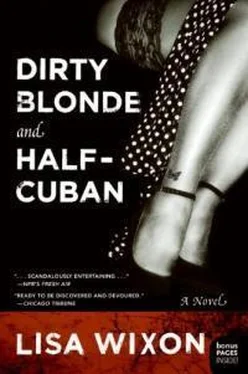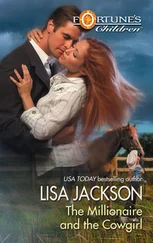Lisa Wixon - Dirty Blonde and Half-Cuban
Здесь есть возможность читать онлайн «Lisa Wixon - Dirty Blonde and Half-Cuban» весь текст электронной книги совершенно бесплатно (целиком полную версию без сокращений). В некоторых случаях можно слушать аудио, скачать через торрент в формате fb2 и присутствует краткое содержание. Жанр: Современная проза, на английском языке. Описание произведения, (предисловие) а так же отзывы посетителей доступны на портале библиотеки ЛибКат.
- Название:Dirty Blonde and Half-Cuban
- Автор:
- Жанр:
- Год:неизвестен
- ISBN:нет данных
- Рейтинг книги:4 / 5. Голосов: 1
-
Избранное:Добавить в избранное
- Отзывы:
-
Ваша оценка:
- 80
- 1
- 2
- 3
- 4
- 5
Dirty Blonde and Half-Cuban: краткое содержание, описание и аннотация
Предлагаем к чтению аннотацию, описание, краткое содержание или предисловие (зависит от того, что написал сам автор книги «Dirty Blonde and Half-Cuban»). Если вы не нашли необходимую информацию о книге — напишите в комментариях, мы постараемся отыскать её.
Dirty Blonde and Half-Cuban — читать онлайн бесплатно полную книгу (весь текст) целиком
Ниже представлен текст книги, разбитый по страницам. Система сохранения места последней прочитанной страницы, позволяет с удобством читать онлайн бесплатно книгу «Dirty Blonde and Half-Cuban», без необходимости каждый раз заново искать на чём Вы остановились. Поставьте закладку, и сможете в любой момент перейти на страницу, на которой закончили чтение.
Интервал:
Закладка:
If my mother truly wanted me to find José Antonio, surely she’d provide a divination. I floated that wish, silently, onto the cumulus clouds the 747 glided through on the way to London.
If you’re listening, I prayed, then send a sign.
8
F our months later,and a few weeks before Christmas break, in the middle of exams and a winter so extreme twelve people died of frostbite, I received a call from my father, who, in an anxious voice, asked about my studies. As a conversational afterthought, he relayed the news that my Aunt June had been diagnosed with the same killer that had downed my mother.
I dashed to the airport, but no plane could get me there fast enough. Aunt June died while I was en route. My father, who’d known about her cancer for nearly two weeks, insisted she not call for me, so as not to “break the concentration” of my studies. At first, I felt betrayed. And then, later, I just felt lost.
At June’s ranch in Mississippi, after the horses were auctioned off and the house sold to new owners, I found myself alone, going through her effects. I remember being grateful then to my aunt for having done the same with my mother’s things when she died ten years before.
It was at the end of the longest week of packing and tossing and sorting that I opened the moldy cardboard box that changed my life.
Inside were notebooks. As I flipped through, slowly at first and then faster, I recognized the handwriting inside. These were my mother’s words. I remembered then she had written in journals nearly every evening, a cup of green tea in her hand.
The journals’ years went backward from 1992, the year my mother died, to 1981, the year after they left Cuba. I searched frenetically. There had to be another box with the earlier years—there hadto be. I grabbed at the nearby pile, sneezed from the dust and mildew, and peeled through tape with my bare hands and teeth. I went through five boxes, then six. The room tipped. I was possessed. Why were these in Mississippi with my aunt, and not in Washington at home with my father? Had Aunt June forgotten about these journals? Or had she intended for me to read them someday? It occurred to me, sadly, that I’d never know.
It was in the seventh box that I discovered my prize: my mother’s journals from the Cuba years, 1977 to 1981. I scanned through them until I saw José Antonio’s initials: J.A.
J.A. and I took Alysia to the beach this afternoon.
J.A. and his family played with her all day.
J.A. is frustrated when we leave for home.
That José Antonio knew of my existence changed something in me. He loved me. Or so said my mother’s diaries, all of which I read nonstop in a week at my aunt’s home. If José Antonio wasn’t allowed to leave Cuba and find me, then it became my responsibility to look for him, and with the help of my mother’s diaries, the impossible suddenly felt within reach.
Without telling my father, I canceled the last semester of graduate school, caught a flight to Washington, and applied for a license to travel to Cuba long-term to find José Antonio. While awaiting an answer, I reread the diaries and then scoured our Watergate apartment for the missing crucial clues: José Antonio’s last name, his address, or the address of our assigned home in Havana all those years ago.
But my mother, unlike her sister, saved few things, believing clutter to be the bane of a traveler. I considered returning to my aunt’s Mississippi ranch to look more closely through the piles of June’s papers, with the hopes of finding at least an old letter with the return address in Havana. But U.S. diplomats in most countries use the military’s mail system, and any envelopes to my aunt from Havana would contain a return address with only a box number now long expired.
My mother’s diaries brought much clarity to the story of José Antonio and the narrative of our lives in Cuba. But she made cryptic the technicalities of my biological father’s whereabouts, and the only mention of him was in the use of his initials, J.A. I imagined her doing so out of fear that my father would discover the terms of the affair. I would never know for sure. I couldn’t help but think that if she hadn’t said José Antonio’s name in the hospital, or if she had never confided in Aunt June, even the mystery of his first name would have died with her.
While this was sinking in, I received word that the U.S. government had denied my request to visit Cuba. Determined to go anyway, via the illicit route Aunt June and I traveled, I phoned my best friend, Susie, and a few of my closest friends. Over dinner in Georgetown, I explained that I’d be going to Cuba for a year to fulfill a promise to my mother and find my biological father. The faces of skepticism that greeted me were quickly supplanted—once the shock wore off—with encouragement. But my friends, many of them on the foreign-service track as well, did not hide their chagrin at the fact that visiting me while I was in Cuba was illegal and, if they were caught, it would be detrimental to their careers. We agreed to keep in touch through e-mail, as phone service in and out of the Communist land was sketchy at best. The thought of not hearing each other’s voices for a whole year made nearly all of us cry. My friends made me promise to tell them if I needed any help, and I swore I would.
Susie stayed the weekend, and together we pored over my mother’s diaries, each taking turns in reading them aloud, and taking meticulous notes on legal pads. Susie’s methodical mind was invaluable in mapping out a strategy to connect the spaghetti-thin links I had to José Antonio’s whereabouts.
“All you have to do is find where you lived in Havana, and then ask the people who worked for your mother about José Antonio. They’re probably still gossiping about the affair down there,” said Susie, her eyes sparkling. “Boy, I wish I could go too.”
We spoke about John, and how I felt betrayed by him, and how I could never forgive him that I never had a chance to say good-bye to my aunt. But I also felt loyalty. Genetic father or not, hadn’t my father fed and housed and educated me? How could I tell him I was going to look for José Antonio? In looking for the family that might have been, would I lose the only family I had left?
The weekend was spent considering the answers. Susie and I chattered in the shorthand and clipped phrases only best friends can understand, and she rehearsed with me the conversation I was shortly to have with my father, in announcing my intentions to look for José Antonio. I cried when she dropped me off at the airport. We promised to e-mail nearly every day. I think she made me swear if I didn’t, I could never smoke a Chesterfield again.
In my suitcase, I had the $25,000 my aunt had left me, more than I’d ever had in my life. It would barely last me a year in Havana, a city as expensive as any world capital, but I was determined.
I flew to Cancún, and in the airport lounge, awaiting a connecting flight to Havana and safely distanced from the U.S., I phoned the father who raised me to tell him I was looking for the father who did not. As the operator placed my call to his cell phone, I took a deep breath.
It was the first time in my life I knew exactly what to do.
9
T he office ofstudent affairs for the University of Havana lies in the heart of Vedado, on palm-lined streets of the formerly wealthy class who prospered under the tyrannical reign of Fulgencio Batista. The mulatoleader exiled himself—to great cheers and jubilation from his subjects—on the first day of 1959. Many in the neighborhood fled as well, to planes that landed in Miami and Newark and Madrid.
Sporting an olive military jacket over pink Lycra hot pants, the woman who authorized my yearlong visa—from July to July—looked at me sternly as I signed my residency agreement. I couldn’t, she lectured, leave Cuba for a year without written permission. In asking for an exception, I must request permission, in writing, one year in advance. When I questioned the nonsensical nature of that rule, I was answered with a shrug and an “Eso es Cuba.”
Читать дальшеИнтервал:
Закладка:
Похожие книги на «Dirty Blonde and Half-Cuban»
Представляем Вашему вниманию похожие книги на «Dirty Blonde and Half-Cuban» списком для выбора. Мы отобрали схожую по названию и смыслу литературу в надежде предоставить читателям больше вариантов отыскать новые, интересные, ещё непрочитанные произведения.
Обсуждение, отзывы о книге «Dirty Blonde and Half-Cuban» и просто собственные мнения читателей. Оставьте ваши комментарии, напишите, что Вы думаете о произведении, его смысле или главных героях. Укажите что конкретно понравилось, а что нет, и почему Вы так считаете.












